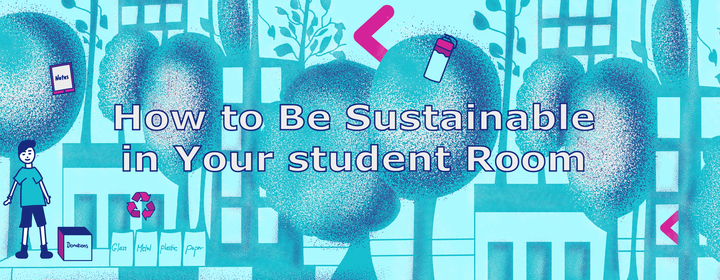How to be More Sustainable in Your Student Home
Tips and Advice
4 mins read
Share

Updated at: 25 November, 2025
Published at: 04 June, 2021
By Hadeel Hossam
How to be More Sustainable in Your Student Home
Tips and Advice
4 mins read

Updated at: 25 November, 2025
Published at: 04 June, 2021
By Hadeel Hossam
Share
It’s no secret that climate change and other environmental issues are only getting worse due to bad consumption habits and other industrial factors. Even though it might seem like too big of an issue to solve, individual actions can help minimise it. As an international student, you can give back to your city by making changes to your lifestyle that benefit the environment. Here are some ways you can be more sustainable in your student home:
8 Ways to Be Sustainable in Your Student Home
1.Reuse & Recycle
The first step in sustainable living in your student home is to change your instinct of throwing things away. Instead, check if your waste can be repurposed, reused or recycled. For example, consider giving away any books or study material to younger students to reuse instead of throwing them away. You can also get reusable food containers instead of using foil paper and buy a reusable water bottle rather than having heaps of plastic ones in your room. As for recycling, many student accommodation have recycling bins that you can use. If not, find the local recycling centre in your city and make a weekly or monthly trip with all your plastic waste.
2. Go Paperless
It’s 2021, which means you can do everything without using paper. Try to digitise your academics as much as possible by using your email to enrol in classes, get your schedule, and learning resources. You can also take notes in class using your laptop, tablet, or phone instead of getting a notebook. Also, some universities like the University of Manchester aid students seeking a sustainable lifestyle by providing course materials in digital form, so make use of that.
3. Save Electricity & Water
One of the most important ways to live an eco-friendly lifestyle is to reduce your carbon footprint by saving electricity. You must know by now that the sources we get electricity from, like coal, are rapidly depleting, so you should be more mindful of your usage. You can do so by taking simple actions such as unplugging the devices that aren’t being used, turning off lights you don’t need and spending less time in the shower . You should also try to minimise your AC usage and opt for wearing layers and bundling up in blankets instead.
As for water, we don’t have much left! With only 0.03% of the 70% of water being freshwater, you’ll probably take shorter showers once you know that one less minute spent showering saves around 150 gallons of water every month.
4. Change Your Diet
Did you know that reducing your meat consumption alone can factor in avoiding drastic climate change? Housing livestock animals like cows and chicken require deforestation which releases damaging methane into the atmosphere. This doesn’t mean you should completely cut meat from your diet, but you can schedule one or two vegan days a week to reduce your consumption, not to mention it would also benefit your health. Encourage your roommates to do the same and propose applying MeatFreeMondays, an initiative endorsed by many celebrities, to the accommodation management if you live in a catered student home. Universities like Goldsmith have taken a step toward a more sustainable campus by banning beef from on-site cafes.
5. Shop Smart
Shopping smart can be applied in many aspects, but mostly food and clothes are the two main things consumed by students. When it comes to food, shopping smart means buying from your city’s local markets like the butchers and the fruit and vegetable shops instead of the imported food in large supermarkets. It also means checking the source of your food to look for sustainable accreditations. Remember to buy things in bulk for highly consumed items like coffee, cereal, or sauces. Ditch the disposable cups and get a reusable one for your daily morning coffee before class.
As for clothing, don’t throw away old clothes too easily; try to either mend, reuse, donate, or recycle them instead. For new clothes, forget about fast fashion and go thrift shopping where you can find great clothes at lower prices. Additionally, you can research sustainable brands in your area to shop from.
6. Walk or Bike To Class
As you already know, more cars on the road mean more air pollution. Not many international students in student accommodation own a car which is all the better. While using public transport or carpooling with friends is still more sustainable, a more environment-friendly choice is to walk or bike to class. More cities and university campuses are now encouraging sustainable living with better pedestrian and bike-friendly lanes. It would help, of course, if you choose a student accommodation that is within a short distance from your campus. Some universities even offer a biking service to students, so check if yours does and take advantage of that!
7. Consider Volunteering
Even though these previous efforts can make a huge difference, you can take it to the next level and sign up for environment-related volunteer work. You don’t have to go too far to look for an opportunity; you can start with your own student accommodation. You can set a day to gather and separate all waste to be recycled or pick up any plastic waste lying around in communal areas. You can also volunteer on your campus with the help of an advisor and pick up waste left by other students or gather unused paper to have it recycled. Try to also look for local volunteer opportunities like beach and park clean-ups.
8. Raise Awareness
Another great step you can take toward sustainability is activism and raising awareness for fellow students in your student home. Propose to your accommodation management holding a meeting with residents and staff members titled ” Ways to be sustainable in your student room”. Your university campus is also a perfect place to spread the word about important environmental issues like climate change and what each person can do as their duty towards the environment and their communities.
These are just some of the things you can apply in your student home to promote green living. Sustainable living doesn’t come overnight, it’s a long journey, and you might make some mistakes here and there, but what matters is that you made an effort. Remember that any step you take, as small as it may seem, can go a long way in maintaining the environment. If each person does their small part, we can fight climate change and ensure our planet lasts enough to live a long, healthy life.
Tips and Advice
By Hadeel Hossam
Share
Tips and Advice
Updated at:
Published at:
By Hadeel Hossam
Share


